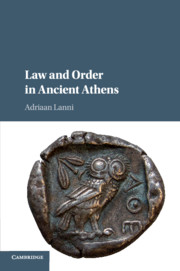Book contents
- Frontmatter
- Dedication
- Contents
- Acknowledgments
- List of Abbreviations
- Introduction: The Puzzle of Athenian Order
- PART ONE
- PART TWO
- THREE The Expressive Eff ect of Statutes
- FOUR Enforcing Norms in Court
- FIVE Court Argument and the Shaping of Norms
- SIX Transitional Justice in Athens: Law, Courts, and Norms
- Conclusion
- Bibliography
- Index
FOUR - Enforcing Norms in Court
from PART TWO
Published online by Cambridge University Press: 05 August 2016
- Frontmatter
- Dedication
- Contents
- Acknowledgments
- List of Abbreviations
- Introduction: The Puzzle of Athenian Order
- PART ONE
- PART TWO
- THREE The Expressive Eff ect of Statutes
- FOUR Enforcing Norms in Court
- FIVE Court Argument and the Shaping of Norms
- SIX Transitional Justice in Athens: Law, Courts, and Norms
- Conclusion
- Bibliography
- Index
Summary
In this chapter we turn to the operation of the Athenian popular courts. Just as in the case of Athenian statutes, court verdicts played a vital role in maintaining order despite the absence of the operation of the rule of law. I argue that the courts may have had a substantial impact on Athenian behavior despite the ad hoc nature and inherent unpredictability and inscrutability of individual court verdicts. While the Athenian courts did not reliably and predictably enforce the laws under which cases were brought, the courts did, in the aggregate, enforce norms. Many of these norms were informal social norms, not subject to explicit legal regulation: norms relating to the treatment of friends and family and private sexual conduct, for example. Other norms enforced by the courts were the subject of statutes, but were unrelated to the charge in the case. I refer to these norms enforced by the courts as “extrastatutory norms,” meaning that they were unrelated to the statute at issue in the case in which they were raised, though some of these norms were the subject of other statutes.
The sheer volume of litigation and routine legal proceedings such as citizenship hearings meant that the average Athenian could anticipate being involved in a legal proceeding far more often than someone living in contemporary Western society, and that during this hearing the jury would very likely consider aspects of his character and past behavior unrelated to the dispute. As a result, the court system played a disciplinary role, providing concrete incentives to conform to a host of social norms. Paradoxically, the aspects of Athenian court argument that seem most removed from a rule of law may actually have played the most important role in fostering order.
Athens’ unusual approach to norm enforcement adds a new twist to the legal academic literature that examines the relationship between social norms and informal sanctions, on the one hand, and formal legal rules and institutions, on the other. While much of the norms literature focuses on the choice between informal and formal norms and institutions, in Athens informal norms were enforced through the formal court system.
- Type
- Chapter
- Information
- Law and Order in Ancient Athens , pp. 119 - 149Publisher: Cambridge University PressPrint publication year: 2016



